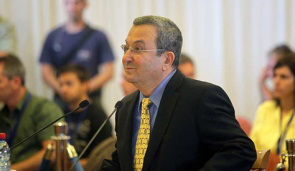Iran and the UN nuclear watchdog have agreed in principle on a probe of suspected work on nuclear weapons, the agency's chief said on Tuesday, hours before nuclear talks between Tehran and six world powers, dpa reported.
"A decision was made to conclude and sign an agreement," International Atomic Energy Agency (IAEA) chief Yukiya Amano said upon returning from Tehran, where he held talks with Foreign Minister Ali-Akbar Salehi and chief nuclear negotiator Saeid Jalili on Monday.
Amano said minor differences remained about the conditions under which Iran would give access to sites, documents and experts, but Jalili told him that these differences would not prevent a deal.
An inspection of the Parchin military site near Tehran, where the IAEA wants to look for signs of possible nuclear warhead tests, would be part of the agreement, according to Amano.
The IAEA director general said on Monday that the outcome of his talks would have a positive impact on the next round of nuclear talks in Baghdad between Iran and the powers - the United States, Britain, France, Germany, Russia and China.
However, the United States said that its concerns would remain until implementation of the inspections.
"Full and transparent cooperation with the IAEA is the first logical step," said Robert Wood, the US envoy at the IAEA.
A Western diplomat told dpa that Amano's announcement would not boost the Baghdad talks, as the deal had yet to be signed.
The talks are aimed at securing guarantees from Iran that it does not plan to build nuclear arms.
The six powers want Iran to stop enriching uranium at 20 per cent, while Tehran wants western sanctions lifted. Both sides have indicated they would consider a deal under which Iran gives up enrichment, in return for getting foreign-made nuclear fuel.
German Foreign Minister Guido Westerwelle said the talks should centre on concrete measures. "The goal is not only to improve the atmosphere, but also to make substantive progress," he said.
On Monday, the US Senate approved tighter sanctions against Iran's Revolutionary Guards forces and their role in oil trade to pressure the Islamic Republic to make concessions.
Delegations travelling to Iraq for the talks faced delays as the capital was engulfed in a sandstorm on Tuesday.
Israel, which considers a nuclear armed Iran a nuclear threat, said it was sceptical about the deal.
Defence Minister Ehud Barak said Iran was pushing for a deal only to avoid tougher sanctions.
He said Israel would only be satisfied if Tehran halts all enrichment - including at levels of 20 per cent and 3.5 per cent, remove all enriched material from Iranian soil and dismantle its new enrichment facility near Qom.
Israeli Premier Benjamin Netanyahu urged the group of six not to soften their demands. "Iran threatens Israel, peace and the entire world," he said.
The United States and Israel have not ruled out military strikes at Iran's nuclear facilities if all other options fail.






